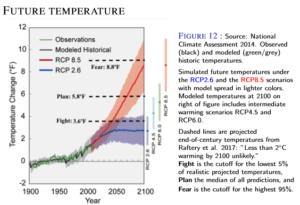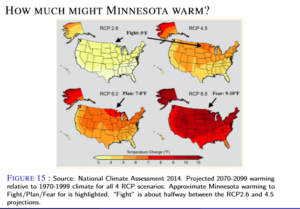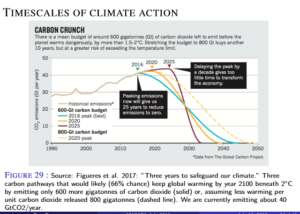On Thursday, July 19th Northwest Metro Climate Action was privileged to host Sam Potter, Climate Scientist with a doctorate in atmospheric and oceanic sciences from Princeton University to speak at the Maple Grove Library. His presentation “Three Minnesota Futures: A Future to Fear, A Future to Prepare For, and A Future to Fight For” provided plentiful insight and information on the causes and current impacts of climate change. He also spoke about the possible future impacts depending on the decisions and changes we make regarding burning of fossil fuels and CO2 emissions.
What makes Minnesota, Minnesota to you?
Sam started with this simple question that sparked images of snowy days and sun sparkle off summer lakes. Or fresh morning snow and hot chocolate on bitter cold days. Or what about the smell of pines and blooming spring flowers? We all have our own feel of Minnesota that we hold in our hearts and consider with pride.
How will climate change impact our great state, then? First, we need to understand what causes climate change. In simplified terms, the sun heats the earth, including land, water, people, etc. The earth in turn emits energy or radiation back into the air. Some of this radiation escapes, but much of it stays. Increased CO2 levels hold more of the radiation in the atmosphere, which in turn causes global warming.
The below chart shows the peaks and valleys of CO2 density in the atmosphere for the last thousands of years. The 0 on the horizontal axis represents current time period, to which you can see an unprecedented spike of CO2 parts per million of 408.32.

Heat on the earth is absorbed in several ways. The first way is by the ocean which absorbs about 90% of it. The remaining 10% of heat is absorbed in the melting ice caps, land with some run off into the atmosphere. The increased heat and therefore increased temperatures of ocean, icecaps and land has impacts such as rising sea levels, killing of coral reefs and other ocean ecosystems, melting permafrost and disrupted farming practices.
Climate scientists use complex models that have been proven out to predict what our world will look like in the future including rainfall, drought, temperatures, sea levels and weather changes. Right now climate scientists have predicted three futures; the future to fight for, the future to plan for and the future to fear. Of course, which future we end up with depends on how much we reduce our carbon output now and in the very near future.

Global warming is more focused on higher latitudes. This means Minnesota is one of the fastest warming states. Most of us don’t need to see the chart below to know our springs and winters have gotten warmer. Already our Minnesota winters have gotten an average of 4-5 degrees F warmer, while spring has gotten 2-3 degrees warmer. In the

In the next 50 years we may lose 30 additional days below freezing and gain 30 days above 90 degrees. Not only will this significantly change Minnesota’s climate but also where and how we grow food, our eco systems and how we live.

The greatest impact of this heat will be on water. As the atmosphere heats up, its demand for water increases, sucking more and more from the earth. And while flood-causing rains will increase, the number of days with light and moderate rain will decrease and days without rain will increase. Droughts will be widespread and common; and those countries or states already water strained will struggle to find relief.
Much of this information we have heard before. This is why Minnesota and the rest of the world is working to mitigate the impacts of climate change. But is it enough? Sam spoke to the Paris Agreement and Minnesota’s own energy goals. No, they are not enough, was his definitive answer.

We have a lot of work to do and we need to start now. Our CO2 reductions need to go beyond the goals we have set for ourselves. But how we do this?
In Sam’s presentation he discusses the importance of meaningful action. Meaningful action recognizes that many of the tools needed for a fossil-fuel free future are already here, but renewable energy, non-car infrastructure, energy efficient buildings, robust local food economies, etc. won’t magically appear on their own. Collectively, people need to demand them (policy changes), while also reducing overconsumption and waste (societal changes).
Meaningful action also recognizes that nothing will magically save us. The only currently viable CO2 removal methods are soil carbon enhancement and re-planting forests, but they at best remove a fraction of the CO2 put into the atmosphere by fossil fuel burning. And finally, meaningful action confronts the past honestly and does not leave anyone behind.
Northwest Metro Climate and many other environmental organizations we partner with are working hard to promote the kind of meaningful action Sam talks about. Whether it be calling your legislatures and demanding they take action, or ensuring our communities are educated and voting on climate, there is no shortage of work to be done. The good news is that this means there are also plenty of ways to get involved.
To learn more contact Northwest Metro Climate Action by emailing Info@nwmetroclimateaction.org to get on our email list to find out more about how you get involved or join us at any of our upcoming events.
To see Sam Potter’s full presentation Click here to see Sam Potter’s full presentation or visit his site here.

